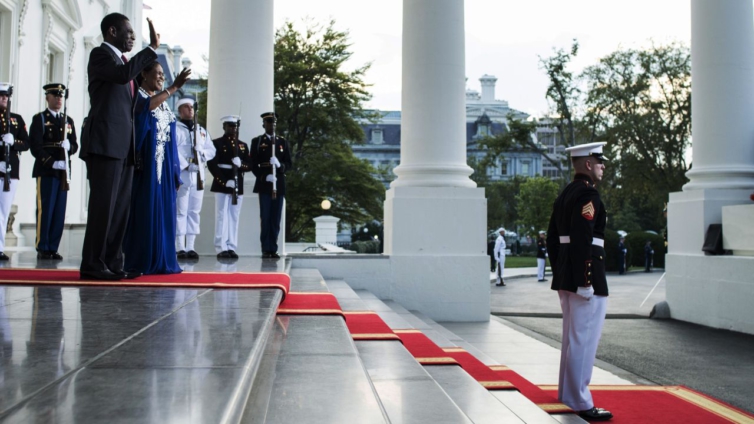Preliminary election results released by Equatorial Guinea’s government on Monday showed the ruling party winning over 99% of votes counted so far in presidential, legislative, and municipal elections held on Sunday.
The tiny, authoritarian, oil-producing Central African state is run by President Teodoro Obiang, the world’s longest-ruling head of state, who is seeking to extend his 43 years in office.
“What you sow is what you reap,” said Obiang, 80, who has regularly won more than 90 percent of the vote in elections conducted over the course of five terms since he seized power from his uncle in a coup in 1979.
“I am sure that the victory is for PDGE,” he said, referring to his party.
Two opposition candidates are standing: Buenaventura Monsuy Asumu, who has already stood in the previous five elections, and Andrés Esono Ondo, who is running for the first time.
Early, partial results showed Obiang’s ruling Democratic Party of Equatorial Guinea (PDGE) and coalition with 67,012 votes out of 67,196 counted so far. The count will continue on Monday, said a statement on the government website.
More than 400,000 people registered to vote in the country of about 1.5 million, which is split between the island of Bioko in the Gulf of Guinea and a coastal mainland sandwiched between Cameroon and Gabon.
“It is a total fraud,” Esono Ondo told Reuters by phone, saying his party would challenge the result in court.
He said some semblance of fair voting was taking place in the island capital Malabo, but his party had evidence that officials elsewhere were casting ballots on voters’ behalf or forcing them to vote for the ruling party.
Government and officials of Equatorial Guinea’s election directorate could not be reached for comment.
Maja Bovcon, a senior Africa analyst at risk intelligence company Verisk Maplecroft, said the election outcome was in no doubt: “The closure of the borders and the harassment and arrests of opposition supporters have been paving the way for the extension of Obiang’s 43-year rule.”
The United States and the European Union called for a free and fair election and raised concern over reports of harassment and intimidation of the opposition and civil society groups. The government rejected the accusations as interference in its electoral process.
Closing his campaign on Friday, Obiang said he decided to bring the presidential election forward by several months and hold it together with the legislative and municipal elections, to save money due to the economic crisis.
Oil and gas production accounts for around three quarters of revenues in the OPEC member state. But output has dwindled in recent years to around 93,000 barrels per day (bpd), from around 160,000 bpd in 2015, as oil fields mature.
Latest Stories
-
Catholics mark Pope’s 12th anniversary with prayers for his recovery
16 seconds -
Trade war escalates as Trump pledges more tariffs
20 minutes -
Man, 35, arrested for smuggling drugs through Aflao Border
35 minutes -
US tariffs could deepen Germany’s recession, says bank
47 minutes -
South Africa’s budget remains stuck as parties reject reduced VAT hike
58 minutes -
South Africa to remove luxury duty on lower value smartphones
1 hour -
Real Madrid beat Atletico after bizarre penalty disallowed
3 hours -
GH¢1.5bn devoted to Agriculture Transformation Agenda, including ‘Nkokɔ Nketenkete’ – Felix Kwakye Ofosu
4 hours -
Van Dijk has ‘no idea’ if he will stay at Liverpool
4 hours -
I’ve faith in the Cedi; we’ve worked on it – Finance Minister
4 hours -
Akufo-Addo’s gov’t awarded GH¢195bn in contracts to MDAs – Ato Forson
4 hours -
There’s no freeze on employment – Finance Minister insists
4 hours -
We’re committed to timely debt servicing – Finance Minister
4 hours -
Ato Forson attributes debt-to-GDP decline to NPP’s 37% Eurobond haircut
4 hours -
GH¢28bn allocated to revitalise struggling energy sector – Ato Forson
5 hours

